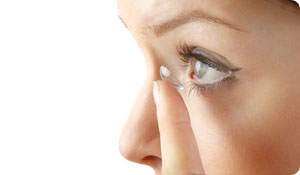
It's common sense to wash your hands before you handle your contact lenses or touch your eyes, but that's only the first step toward keeping your lenses safe, and your eyes healthy.
Whether you wear soft, gas permeable, or hybrid contact lenses, or use daily or extended-wear contact lenses, "Contact lenses are convenient, comfortable, and safe, as long as you follow established wear and care guidelines," says Michael J. Lipson OD, FAAO, of the University of Michigan's Kellogg Eye Center. It is very important to follow these guidelines because contact lens wearers are at higher risk of contracting infections and more serious eye problems than non-wearers.
The contact lens products you use, and the way you use them, can make all the difference between a problem-free experience and potential loss of vision.
Do ask your ophthalmologist or optometrist to recommend contact lens cleaning, rinsing, and storage products, and the proper way to clean your lenses.
Do wash your hands well before you insert or remove contact lenses.
Do check your contact lenses for tears or holes before inserting them in your eyes.
Do apply makeup after you have inserted your lenses, being careful to avoid getting any make-up in your eye or on your lenses. Use magnifying mirror if necessary.
Don't apply makeup to the inner rims of your eyelids when you are wearing contact lenses.
Do remove your lenses immediately if your eyes become itchy, irritated, or red; or if your vision gets blurry or changes in any way.
Do discard all used solution from your lens case before refilling.
Do clean, rinse, and store your lenses as directed by your eye care provider and the instructions on your cleaning and storage solution bottles as soon as you remove the lenses from your eyes.
Don't use tap water, homemade saline solution or any other non-sterile solution to care for your lenses.
Don't put your lenses in your mouth. Your mouth and saliva are not sterile.
Do discard expired or contaminated lens solution immediately.
Don't transfer contact lens solutions from their original containers to other containers for travel or other purposes. Purchase travel containers to avoid contamination or accidental use of the wrong product.
Do clean your contact lens case frequently when not in use, and let it air dry completely before using it again.
Do replace contact lens containers at least three or four times a year.
Do see your eye care provider annually for eye exams and prescription updates. See your provider immediately if you have any trouble with your eyes or your lenses.
Don't wear extended-wear lenses for longer than recommended by your eye care provider.
Don't wear daily-wear lenses while sleeping.
Michael Lipson, OD, FAAO, reviewed this article.
Sources:
Michael J. Lipson OD, FAAO
University of Michigan Department of Ophthalmology and Visual Science
Livonia Center for Specialty Care, Livonia, MI
Centers for Disease Control and Prevention. "Protect Your Eyes: Healthy and Safe Contact Lens Use." Web. Page last updated 29 March 2013. Accessed 6 June 2013.
http://www.cdc.gov/contactlenses/
Szczotka-Flynn LB, Pearlman E, Ghannoum M. "Microbial contamination of contact lenses, lens care solutions, and their accessories: a literature review." Eye & Contact Lens 2010 March; 36(2): 116-29. Web. Accessed April 2013.
http://www.ncbi.nlm.nih.gov/pubmed/20168237





